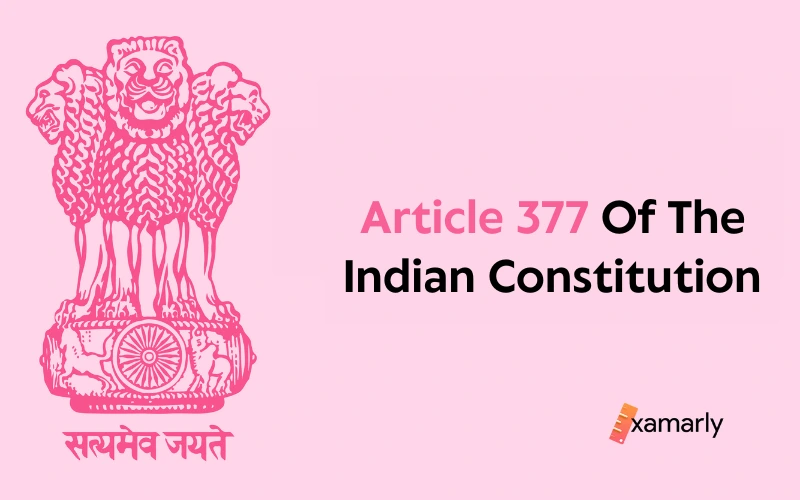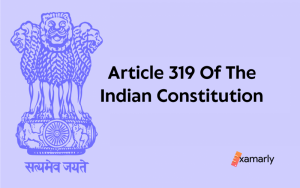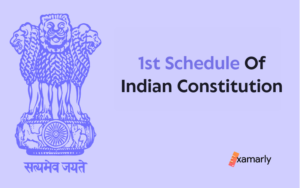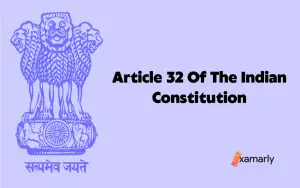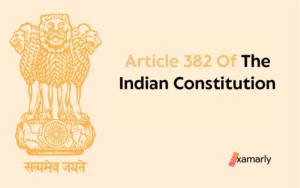An Overview
Welcome to our blog on Article 377 of the Indian Constitution, which deals with the provisions regarding the Comptroller and Auditor-General of India. This article is an important aspect of the Indian Constitution, which outlines the role and responsibilities of the Comptroller and the Auditor-General of India.
Article 377 of the Indian Constitution lays down the provisions for the transition of the position of the Auditor-General of India to the position of the Comptroller and Auditor-General of India at the time of the commencement of the Indian Constitution.
Let us delve into the details of the article.
- An Overview
- What Does Article 377 Of The Indian Constitution Deal With?
- Explanation Of Article 377 Of The Indian Constitution
- Summing Up
- FAQs Related To Article 377 Of The Indian Constitution
- Which Chapter Of The Constitution Of India Does Article 377 Of The Indian Constitution Fall Under?
- Which Articles Of The Indian Constitution Mention The Comptroller and The Auditor-General Of India?
- What Is The Role Of The Comptroller And The Auditor-General Of India?
- Who Becomes The Comptroller And The Auditor-General Of India At The Time Of The Commencement Of The Constitution?
- Are There Any Conditions For The Transition Of The Position Of The Auditor-General Of India To The Position Of The Comptroller And The Auditor-General Of India?
- What Are The Entitlements Of The Comptroller And The Auditor-General Of India?
- How Long Can The Comptroller And The Auditor-General Of India Hold Office?
- What Is The Significance Of The Role Of The Comptroller And The Auditor-General Of India?
- What Is The Article In The Indian Constitution That Deals With The Comptroller And The Auditor-General Of India?
- What Are The Impacts Of The Comptroller And Auditor-General Of India On The Governance And Administration Of The Country?
- Is The Comptroller And The Auditor-General Of India An Appointed Or An Elected Position?
- How Does The Transition Of The Position Of The Auditor-General Of India To The Position Of The Comptroller And The Auditor-General Of India Affect The Individual Holding The Office At The Time Of The Commencement Of The Constitution?
What Does Article 377 Of The Indian Constitution Deal With?
Article 377 of the Indian Constitution deals with the provisions that are related to the Comptroller and the Auditor-General of India, who is an independent official appointed by the President of India to audit and examine the accounts of the Union government and the State governments and their agencies.
Let us take a look at the text of the article as quoted in the official document of the Constitution of India. It reads as follows:
377. Provisions as to Comptroller and Auditor-General of India.—The Auditor-General of India holding office immediately before the commencement of this Constitution shall, unless he has elected otherwise, become on such commencement the Comptroller and Auditor-General of India and shall thereupon be entitled to such salaries and to such rights in respect of leave of absence and pension as are provided for under clause (3) of article 148 in respect of the Comptroller and Auditor-General of India and be entitled to continue to hold office until the expiration of his term of office as determined under the provisions which were applicable to him immediately before such commencement.
Explanation Of Article 377 Of The Indian Constitution
Article 377 of the Indian Constitution talks about the transition of the position of Auditor-General of India to the position of Comptroller and Auditor-General of India at the time of the commencement of the Indian Constitution.
Article 377 also states that the person who was holding the office of Auditor-General of India immediately before the commencement of the Indian Constitution will automatically become the Comptroller and Auditor-General of India at the time of the commencement of the Constitution. This person will also be entitled to the same salaries and benefits such as leave of absence and pension that are provided for the Comptroller and Auditor-General of India under Clause (3) of Article 148 of the Indian Constitution.
Additionally, this person will be able to continue holding the office until the end of their term of office as determined under the provisions that were applicable to them before the commencement of the Constitution.
You Might Also Like:
| Article 376 of the Indian Constitution | Article 375 of the Indian Constitution |
| Article 374 of the Indian Constitution | Article 373 of the Indian Constitution |
Summing Up
To sum up, Article 377 of the Indian Constitution describes the transition of the position of the Auditor-General of India to the position of the Comptroller and Auditor-General of India and how this transition will affect the individual holding the office at the time of the commencement of the Indian Constitution.
FAQs Related To Article 377 Of The Indian Constitution
Which Chapter Of The Constitution Of India Does Article 377 Of The Indian Constitution Fall Under?
Article 377 of the Indian Constitution falls under Chapter XXI of the Constitution of India. The chapter contains articles dealing with temporary, transitional, and special provisions.
Which Articles Of The Indian Constitution Mention The Comptroller and The Auditor-General Of India?
The Comptroller and the Auditor-General of India are mentioned under Articles 148 to 151 of the Indian Constitution, which deals with the appointment, powers, and duties of the Comptroller and the Auditor-General, who is an independent official appointed by the President of India to audit and examine the accounts of the Union and State governments and their agencies.
What Is The Role Of The Comptroller And The Auditor-General Of India?
The Comptroller and the Auditor-General of India are independent officials appointed by the President of India to audit and examine the accounts of the Union government and the State governments and their agencies.
Who Becomes The Comptroller And The Auditor-General Of India At The Time Of The Commencement Of The Constitution?
The person who was holding the office of the Auditor-General of India immediately before the commencement of the Indian Constitution will automatically become the Comptroller and the Auditor-General of India at the time of the commencement of the Constitution.
Are There Any Conditions For The Transition Of The Position Of The Auditor-General Of India To The Position Of The Comptroller And The Auditor-General Of India?
The person who holds the office of the Auditor-General of India immediately before the Indian Constitution comes into effect will automatically become the Comptroller and the Auditor-General of India unless they have chosen not to.
In other words, the person who holds the office of the Auditor-General of India can choose not to become the Comptroller and the Auditor-General of India when the Constitution comes into effect. If he has elected otherwise, he will not become the Comptroller and the Auditor-General of India.
What Are The Entitlements Of The Comptroller And The Auditor-General Of India?
The Comptroller and the Auditor-General of India are entitled to the same salaries and benefits such as leave of absence and pension that are provided for under Clause (3) of Article 148 of the Constitution.
How Long Can The Comptroller And The Auditor-General Of India Hold Office?
The Comptroller and Auditor-General of India can hold office until the end of their term of office as determined under the provisions that were applicable to them before the commencement of the Constitution.
What Is The Significance Of The Role Of The Comptroller And The Auditor-General Of India?
The Comptroller and Auditor-General of India play a crucial role in ensuring the financial integrity of the government and holding it accountable to the citizens.
What Is The Article In The Indian Constitution That Deals With The Comptroller And The Auditor-General Of India?
Article 377 of the Indian Constitution deals with the provisions regarding the Comptroller and the Auditor-General of India.
What Are The Impacts Of The Comptroller And Auditor-General Of India On The Governance And Administration Of The Country?
The Comptroller and the Auditor-General of India play a crucial role in ensuring transparency and accountability in the functioning of the government, thus impacting the governance and administration of the country.
Is The Comptroller And The Auditor-General Of India An Appointed Or An Elected Position?
The Comptroller and the Auditor-General of India is an appointed position.
How Does The Transition Of The Position Of The Auditor-General Of India To The Position Of The Comptroller And The Auditor-General Of India Affect The Individual Holding The Office At The Time Of The Commencement Of The Constitution?
The transition of the position of the Auditor-General of India to the position of the Comptroller and Auditor-General of India doesn’t affect the individual holding the office as they will be entitled to the same salaries and benefits such as leave of absence and pension that are provided for under Clause (3) of Article 148 of the Constitution. They can continue holding the office until the end of their term of office as determined under the provisions that were applicable to them before the commencement of the Constitution.


